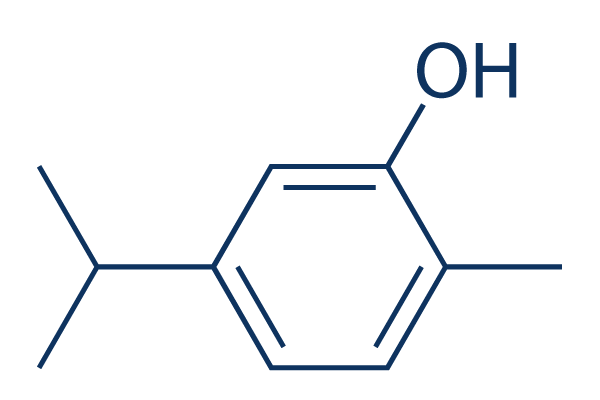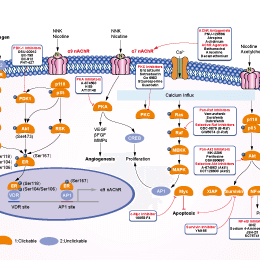
- Bioactive Compounds
- By Signaling Pathways
- PI3K/Akt/mTOR
- Epigenetics
- Methylation
- Immunology & Inflammation
- Protein Tyrosine Kinase
- Angiogenesis
- Apoptosis
- Autophagy
- ER stress & UPR
- JAK/STAT
- MAPK
- Cytoskeletal Signaling
- Cell Cycle
- TGF-beta/Smad
- DNA Damage/DNA Repair
- Compound Libraries
- Popular Compound Libraries
- Customize Library
- Clinical and FDA-approved Related
- Bioactive Compound Libraries
- Inhibitor Related
- Natural Product Related
- Metabolism Related
- Cell Death Related
- By Signaling Pathway
- By Disease
- Anti-infection and Antiviral Related
- Neuronal and Immunology Related
- Fragment and Covalent Related
- FDA-approved Drug Library
- FDA-approved & Passed Phase I Drug Library
- Preclinical/Clinical Compound Library
- Bioactive Compound Library-I
- Bioactive Compound Library-Ⅱ
- Kinase Inhibitor Library
- Express-Pick Library
- Natural Product Library
- Human Endogenous Metabolite Compound Library
- Alkaloid Compound LibraryNew
- Angiogenesis Related compound Library
- Anti-Aging Compound Library
- Anti-alzheimer Disease Compound Library
- Antibiotics compound Library
- Anti-cancer Compound Library
- Anti-cancer Compound Library-Ⅱ
- Anti-cancer Metabolism Compound Library
- Anti-Cardiovascular Disease Compound Library
- Anti-diabetic Compound Library
- Anti-infection Compound Library
- Antioxidant Compound Library
- Anti-parasitic Compound Library
- Antiviral Compound Library
- Apoptosis Compound Library
- Autophagy Compound Library
- Calcium Channel Blocker LibraryNew
- Cambridge Cancer Compound Library
- Carbohydrate Metabolism Compound LibraryNew
- Cell Cycle compound library
- CNS-Penetrant Compound Library
- Covalent Inhibitor Library
- Cytokine Inhibitor LibraryNew
- Cytoskeletal Signaling Pathway Compound Library
- DNA Damage/DNA Repair compound Library
- Drug-like Compound Library
- Endoplasmic Reticulum Stress Compound Library
- Epigenetics Compound Library
- Exosome Secretion Related Compound LibraryNew
- FDA-approved Anticancer Drug LibraryNew
- Ferroptosis Compound Library
- Flavonoid Compound Library
- Fragment Library
- Glutamine Metabolism Compound Library
- Glycolysis Compound Library
- GPCR Compound Library
- Gut Microbial Metabolite Library
- HIF-1 Signaling Pathway Compound Library
- Highly Selective Inhibitor Library
- Histone modification compound library
- HTS Library for Drug Discovery
- Human Hormone Related Compound LibraryNew
- Human Transcription Factor Compound LibraryNew
- Immunology/Inflammation Compound Library
- Inhibitor Library
- Ion Channel Ligand Library
- JAK/STAT compound library
- Lipid Metabolism Compound LibraryNew
- Macrocyclic Compound Library
- MAPK Inhibitor Library
- Medicine Food Homology Compound Library
- Metabolism Compound Library
- Methylation Compound Library
- Mouse Metabolite Compound LibraryNew
- Natural Organic Compound Library
- Neuronal Signaling Compound Library
- NF-κB Signaling Compound Library
- Nucleoside Analogue Library
- Obesity Compound Library
- Oxidative Stress Compound LibraryNew
- Plant Extract Library
- Phenotypic Screening Library
- PI3K/Akt Inhibitor Library
- Protease Inhibitor Library
- Protein-protein Interaction Inhibitor Library
- Pyroptosis Compound Library
- Small Molecule Immuno-Oncology Compound Library
- Mitochondria-Targeted Compound LibraryNew
- Stem Cell Differentiation Compound LibraryNew
- Stem Cell Signaling Compound Library
- Natural Phenol Compound LibraryNew
- Natural Terpenoid Compound LibraryNew
- TGF-beta/Smad compound library
- Traditional Chinese Medicine Library
- Tyrosine Kinase Inhibitor Library
- Ubiquitination Compound Library
-
Cherry Picking
You can personalize your library with chemicals from within Selleck's inventory. Build the right library for your research endeavors by choosing from compounds in all of our available libraries.
Please contact us at [email protected] to customize your library.
You could select:
- Antibodies
- Bioreagents
- qPCR
- 2x SYBR Green qPCR Master Mix
- 2x SYBR Green qPCR Master Mix(Low ROX)
- 2x SYBR Green qPCR Master Mix(High ROX)
- Protein Assay
- Protein A/G Magnetic Beads for IP
- Anti-Flag magnetic beads
- Anti-Flag Affinity Gel
- Anti-Myc magnetic beads
- Anti-HA magnetic beads
- Magnetic Separator
- Poly DYKDDDDK Tag Peptide lyophilized powder
- Protease Inhibitor Cocktail
- Protease Inhibitor Cocktail (EDTA-Free, 100X in DMSO)
- Phosphatase Inhibitor Cocktail (2 Tubes, 100X)
- Cell Biology
- Cell Counting Kit-8 (CCK-8)
- Animal Experiment
- Mouse Direct PCR Kit (For Genotyping)
- New Products
- Contact Us
Carvacrol
Synonyms: cymophenol
Carvacrol (Cymophenol), monoterpenic phenol isomeric with thymol, has diverse activities such as antimicrobial, antitumor, an-timutagenic, antigenotoxic, analgesic, antispasmodic, anti-inflammatory, angiogenic, antiparasitic, antiplatelet, AChE inhibitory, antielastase, insecticidal, antihepatotoxic and hepatoprotective activities.

Carvacrol Chemical Structure
CAS No. 499-75-2
Purity & Quality Control
Batch:
Purity:
99.87%
99.87
Carvacrol Related Products
| Related Targets | mAChR nAChR AChE | Click to Expand |
|---|---|---|
| Related Products | PNU-120596 Benzethonium Chloride Arecoline HBr Otilonium Bromide Lycorine Hyoscyamine (-)-Huperzine A (HupA) Nitenpyram Cytisine Chelidonine | Click to Expand |
| Related Compound Libraries | FDA-approved Drug Library Natural Product Library Neuronal Signaling Compound Library CNS-Penetrant Compound Library Anti-alzheimer Disease Compound Library | Click to Expand |
Signaling Pathway
Biological Activity
| Description | Carvacrol (Cymophenol), monoterpenic phenol isomeric with thymol, has diverse activities such as antimicrobial, antitumor, an-timutagenic, antigenotoxic, analgesic, antispasmodic, anti-inflammatory, angiogenic, antiparasitic, antiplatelet, AChE inhibitory, antielastase, insecticidal, antihepatotoxic and hepatoprotective activities. |
|---|
| In vitro | ||||
| In vitro | Carvacrol (CVC) possesses weak antioxidant and cytotoxic activity in cultured primary rat neurons. In addition, Carvacrol has weak antioxidant properties and little anticancer potentials in rat N2a neuroblastoma cell line[1]. Carvacrol is a novel inhibitor of transient receptor potential (TRP) channels in drosophila and mammalian. In human hepatoma HepG2 cells, Carvacrol induces cell apoptosis by selectively decreasing phosphorylation of extracellular signal-regulated kinase 1/2 (ERK1/2) and P38; In human macrophage-like U937 cells, in response to lipopolysaccharide treatment, Carvacrol activates peroxisome proliferator-activated receptors (PPAR alpha and gamma) and suppresses cyclooxygenase-2 (COX-2) mRNA and protein expression[2]. | |||
|---|---|---|---|---|
| Cell Research | Cell lines | cultured primary rat neurons and N2a neuroblastoma cells | ||
| Concentrations | 10, 25, 50, 100, 200 and 400 mg/L | |||
| Incubation Time | 24 h | |||
| Method | The cells are seeded in 48-well plates. Cells are incubated at 37 °C in a humidified 5 % CO2/95 % air mixture and treated with carvacrol at different concentrations (10, 25, 50, 100, 200 and 400 mg/L) for 24 h. MTT substrate solution is used. Briefly, MTT is added to the cell cultures for 3 h. Formed formazan crystals are dissolved in dimethyl sulfoxide (DMSO), MTT is added to the cell cultures for 3 h. Formed formazan crystals are dissolved in dimethyl sulfoxide (DMSO). | |||
| In Vivo | ||
| In vivo | Carvacrol has the ability to protect liver against ischemia/reperfusion injury in rats. In the central nervous system, Carvacrol is regarded as a potential drug for Alzheimer's disease due to its inhibitory effect on acetylcholinesterase (AChE) activity by using phenolic hydroxyl group of carvacrol to bind to AChE and leading to a loss of function of AChE. In addition, Carvacrol is found to have an antidepressant-like effect in mice by affecting the dopaminergic system. Dietary carvacrol supplementation prevents high fat diet-induced obesity by modulating gene expressions that lead to adipogenesis and inflammation. Carvacrol crosses the blood-brain barrier easily and rapidly[2]. | |
|---|---|---|
| Animal Research | Animal Models | Male ICR mice |
| Dosages | 50 mg/kg | |
| Administration | i.c.v. | |
Chemical Information & Solubility
| Molecular Weight | 150.22 | Formula | C10H14O |
| CAS No. | 499-75-2 | SDF | Download Carvacrol SDF |
| Density | 0.976 g/mL at 20 °C | ||
| Storage (From the date of receipt) | 2 years -20°C liquid | ||
|
In vitro |
DMSO : 30 mg/mL ( (199.7 mM) Moisture-absorbing DMSO reduces solubility. Please use fresh DMSO.) Ethanol : 30 mg/mL Water : Insoluble |
Molecular Weight Calculator |
|
In vivo Add solvents to the product individually and in order. |
In vivo Formulation Calculator |
||||
Preparing Stock Solutions
Molarity Calculator
In vivo Formulation Calculator (Clear solution)
Step 1: Enter information below (Recommended: An additional animal making an allowance for loss during the experiment)
mg/kg
g
μL
Step 2: Enter the in vivo formulation (This is only the calculator, not formulation. Please contact us first if there is no in vivo formulation at the solubility Section.)
% DMSO
%
% Tween 80
% ddH2O
%DMSO
%
Calculation results:
Working concentration: mg/ml;
Method for preparing DMSO master liquid: mg drug pre-dissolved in μL DMSO ( Master liquid concentration mg/mL, Please contact us first if the concentration exceeds the DMSO solubility of the batch of drug. )
Method for preparing in vivo formulation: Take μL DMSO master liquid, next addμL PEG300, mix and clarify, next addμL Tween 80, mix and clarify, next add μL ddH2O, mix and clarify.
Method for preparing in vivo formulation: Take μL DMSO master liquid, next add μL Corn oil, mix and clarify.
Note: 1. Please make sure the liquid is clear before adding the next solvent.
2. Be sure to add the solvent(s) in order. You must ensure that the solution obtained, in the previous addition, is a clear solution before proceeding to add the next solvent. Physical methods such
as vortex, ultrasound or hot water bath can be used to aid dissolving.
Tech Support
Answers to questions you may have can be found in the inhibitor handling instructions. Topics include how to prepare stock solutions, how to store inhibitors, and issues that need special attention for cell-based assays and animal experiments.
Tel: +1-832-582-8158 Ext:3
If you have any other enquiries, please leave a message.
* Indicates a Required Field
Tags: buy Carvacrol | Carvacrol supplier | purchase Carvacrol | Carvacrol cost | Carvacrol manufacturer | order Carvacrol | Carvacrol distributor







































